Filmmaker Terry Gilliam is a master at immersing us in an alternative world. The playscape of his imagination is always a rich and fantastic place to frolic; his vision is ceaselessly intriguing. The stories Gilliam tells most often take place in a world that is slightly abstracted, futuristic or other by degree. Gilliam uses settings to illuminate the particulars of our life and times with original and uncanny insight.
His latest film, The Zero Theorem is set in the near future of “London Sooner Than You Think,” and it was shot on a shoestring budget of $8.5 million in Bucharest, Romania. With its extraordinary production design by David Warren, imaginative costumes by Carlo Poggioli, transformative hair and make-up by Kirstin Chalmers, and superb special effects under the supervision of Nick Allder, The Zero Theorem looks like a Hollywood movie. It features an extraordinary cast of stars – whom you may or may not recognize until the end credits roll, including Christoph Waltz (Qohen), Matt Damon (Management), and Tilda Swinton (Dr. Shrink-Rom, a software program psychoanalyst). With memorable performances from the acting ensemble that includes David Thewlis (Qohen’s supervisor, Joby) and Lucas Hedges (Management’s son, Bob), and a break-out performance by French actress Mélanie Thierry (Bainsley), who Gilliam compares to a “Stradivarius.” “She’s fearless. Every man I know is besotted with her,” Gilliam gushes.
Gilliam has dedicated The Zero Theorem to Producer Dean Zanuck, who “always kept the ball rolling,” championing the project for more than a decade. (Regrettably, Zanuck passed away just before shooting began.) Zanuck discovered the screenplay by first-timer Pat Rushin indirectly through Project Greenlight, the reality filmmaking competition hosted by Matt Damon and Ben Affleck. Back in 2008, Dean Zanuck offered Terry Gilliam the opportunity to direct The Zero Theorem. While Gilliam was attracted to the wit, dialogue and simplicity of the story, at that juncture, he elected to direct The Imaginarium of Doctor Parnassus instead. When The Zero Theorem boomeranged back for his reconsideration in 2012, with financing and a marvelous cast, Gilliam committed to direct.
The Zero Theorem tells the story of a scientist, a quant, Qohen Leth, who yearns for solitude. He lives in a state of perpetual anxiety that he will miss the phone call that will define the meaning of his life, while passing the eternity of his days in a chaotic office and the eternity of his nights at requisite work functions. The demands of his job as an employee of Mancom are so invasive that Qohen claims he is “not well.” He applies for disability leave — or minimally, for consideration to be granted permission to work from home, from where he can be even more productive and valuable to the Mancom corporation, he proposes. “Be careful what you wish for,” his supervisor Joby tells him as he reveals that Qohen’s wish has been granted. Qohen has been reassigned to crack a sophisticated scientific paradox, from the comfort of his burnt-out chapel home.
Can we ever find solitude in an increasingly connected and constricted world?, Gilliam forces us to consider. “I’m obsessed about this. I think it’s when you are alone that you actually make sense of who you are,” he confesses. The film takes on the notion that “happiness” will result from “the quantification of all phenomena” and faith in the belief that any “equation” can provide “the ultimate meaning of life.” In our rush to be connected, Gilliam’s tale illustrates how we may sacrifice privacy and intimacy to an irrecoverable degree. In the world of The Zero Theorem, physical contact is minimal. Bainsley admits, she doesn’t “do sexual intercourse, it’s too dangerous;” she practices virtual “tantrick biometric interfacing” alternatively. Ultimately, The Zero Theorem is a story about death – one man’s death and perhaps even the death of the universe.
Gilliam admits that The Zero Theorem is not a genre film. “Hopefully, it’s unlike any film you have seen recently; no zombies, no caped crusaders, no aliens or gigantic explosions — actually, I might have lied about that last item,” he teases.
I had the great pleasure of speaking by phone with my cinematic hero Terry Gilliam about his latest thrill ride of a film, The Zero Theorem. I am hoping that all the elements conspire soon to allow this creative genius the opportunity to get his call and to realize the dream of completing his long-awaited magnum opus, The Death of Don Quixote. We are always richer for the experience of navigating the enticing chaos that issues forth from Gilliam’s head and onto our screens.
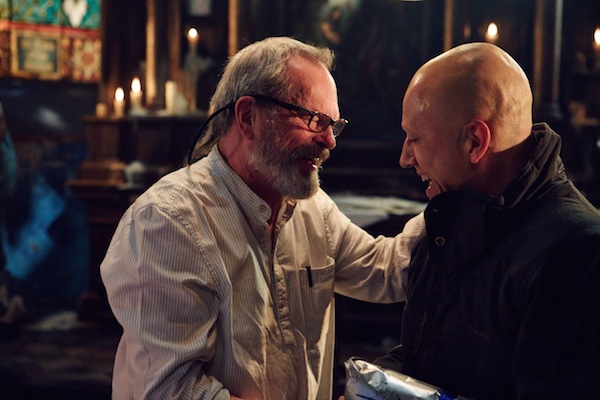
Terry Gilliam’s “THE ZERO THEOREM.” Photo courtesy of Amplify Releasing.
Sophia Stein: You have commented: “When I made ‘Brazil’ in 1984, I was trying to paint a picture of the world I thought we were living in then. The Zero Theorem is a glimpse of the world I think we are living in now.” How so?
Terry Gilliam: What’s the world today? We’re in a very connected world. Shopping is easier than ever! Ads are waiting to tell us what we really want, and what will change our lives. It is a very frenetic world. The workplace is more fun than it’s ever been. No satanic steel mills for Mancom. It’s skateboards and roller blades, bright clothing and fun. Everybody’s having a good time – except for our hero, who isn’t. That’s why it’s a disconnect. The modern world is just too much for him.
I do think we are living in an age where we’re just entertained the whole time. We’re distracted at a source, with color and light and bounce and things to take our attention. So we never really have to get down to any serious thinking about anything.
Sophia: The film was made with a very small budget which forced you to work instinctively and to make some outrageous creative leaps. What surprising discoveries did you make you along the way?
Terry: That Romanians are really hard working, great people; that’s what I discovered. Bucharest – I discovered Bucharest, which as a city, I really find fascinating. Between the world wars, it was the Paris of the East. It has incredible architecture, a great mixture of stuff. Getting away from London and the controlled West where our every move is made safer, you arrive in Bucharest, and – “You’re on your own folks, take responsibility for your lives, and start living again.” I loved it. Quite honestly, I thought the crews were fantastic, the people were wonderful, the food – well, certain parts of the food — were wonderful. And the alcohol was cheap. So, what more can you ask.
Sophia: I read that you used Google Earth to do your location scouting? – which is completely wild. Is this the first time you had done that?
Terry: I’d used it on one of my more recent previous versions of Quixote. I was doing it all, sitting at my computer and driving the location scouts crazy because I was finding buildings in villages quicker than they could find them. I’m sitting in London doing all of this. It’s like the guy flying those drones into Afghanistan. It’s all there. See that’s the thing — the web is a real Damocles sword, I think. It’s a double-edged blade, and it’s hanging over us. But if you use it properly, it’s fantastic because it’s out there. If you want to look at the world, if you need to travel the world, you can do that on Google Earth very easily. I love the fact that we have at our fingertips, incredible technology that most people aren’t using. People are just using the technology for what they’re used to doing – gossiping over the back garden fence.
Sophia: I was really surprised to learn that the screenplay emerged from Project Greenlight. What is it like for you as a director to work on a screenplay by another writer, as opposed to a “passion project” that you generate yourself?
Terry: [in a confessional tone] It’s a relief. Because I don’t have to spend years of my life beating myself senseless. The late, great Dick Zanuck tried to get me involved several years ago. I was very intrigued by the script and the ideas, and then it didn’t happen. I did Parnassus and moved on. Then when Quixote collapsed again, I needed to do something! — you know, I was going crazy. There was a script there, and the money was there (much less money, mind you, than when I was originally doing it), but with someone like Christoph Waltz on board, we were off and running. I got Chris and literally two-and-a half months later, we were shooting. And that doesn’t happen!
So my time was not spent going over the script and making it mine. Pat Rushin was in Florida, and the schedule didn’t allow us to really talk it through. We did some emailing, I suggested a few things, and it was just off and running. So for me, it was like we got two months to create a world. And we did. And then we started shooting.
Often we would start a particular scene and Christoph would question: “What is this? What is this supposed to be about?” “I don’t know. It’s in the script. Let’s just shoot it. Come on,” I’d encourage him. We’d often fight to make sense, at least to ourselves, of why we were doing a particular thing. But it required discussion on the set when we were ready to go. We marched on and did it, and I felt pretty happy. Back in the editing room is when we really started doing the writing that I should have probably done before we started. But it was interesting. I really enjoyed it because I love the editing stage. It was wonderful to be able to go: O.k., we’ve got this material here, we have great performances, great moments, how do we make it work now? So we really started playing with it, loosened it up, fragmented it a bit, stuck it back together, and ended up, I think, with a better film than we started out to make.
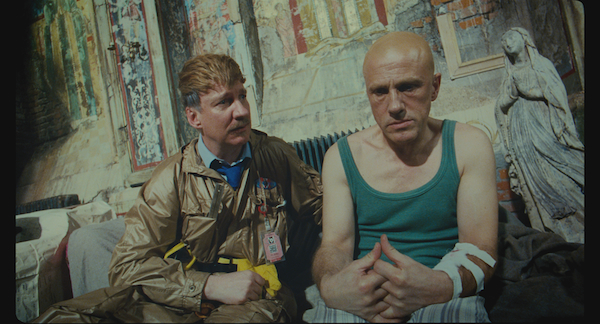
Terry Gilliam’s “THE ZERO THEOREM.” Photo courtesy of Amplify Releasing.
Sophia: Christoph Waltz, Matt Damon, Tilda Swinton — need I say more. You have observed that “The thing I enjoy is the actors. They come in and surprise me. You give them space, and they surprise you.” How did each of them surprise you?
Terry: [He sighs with wonder at the magnitude of it all.] Oh … well, Christoph, he completely became Qohen. I had dinner with him a month ago, and I didn’t recognize the guy I had dinner with. He’s not Qohen; Qohen doesn’t look like Christoph Waltz. Christoph is just so good. The stuff he does just sitting there and working on the computer is so subtle and watchable. Nothing is fake. He really is the genuine article. Because he’s so smart, his ideas are always good. Sometimes, I will argue with him because I think that idea is better in another place, but it is great to work with somebody who is so committed that we’ve got to sort this stuff out so that we both believe that what we are doing is truthful.
Sophia: Waltz’s character, Qohen, refers to himself in the third person, using the collective “we.” What did you and Christoph make of that behavior?
Terry: It was in the script, that’s what Pat Rushin wrote. O.k., fine, I bought it. I could understand somebody being alone, and he just starts talking to himself like this. Christoph emailed me that he thinks this is a gimmick: “I don’t like it, I don’t see how to play this. It’s just a bit of schtick, this ‘we’ business.” But then, Christoph went and talked to a Viennese psychiatrist who assured him, “No, this is what happens with people who spend an inordinate amount of time on their own. They begin to refer to themselves in the third person.” So once the psychiatrist (especially a Viennese psychiatrist, had confirmed it), the young Austrian actor Christoph Waltz handled the “we” beautifully.
Tilda Swinton was wonderful. I’ve always wanted to work with her. I designed this hairstyle for her, this pyramidal thing, pretty horrible. When we first met, and we were trying on costumes and things, she said, “You know, I’ve been thinking about it. As a psychiatrist, I should identify with my patients, and I think that since Qohen’s bald, I should be bald.” So we did both. Her hair style became a wig, and then she got to rap bald.
Matt Damon — I had never seen Matt play a character like Management. Management is such a smug, arrogant, pompous, controlling character — and yet very charming. Matt had just been doing Elysium, so his head was shaved. So I was thinking, we’ll just put a von Bismarck wig on him, which really changes his face, all that white hair. I just love working with him because I think Matt Damon is one of the great actors America has. He can do just about anything, and he is so subtle.
Then there’s David Thewlis, who makes Joby, the Supervisor, so funny in the movie. David and Chis had more time working together on more scenes, and they just kind of became a wonderful double-act.
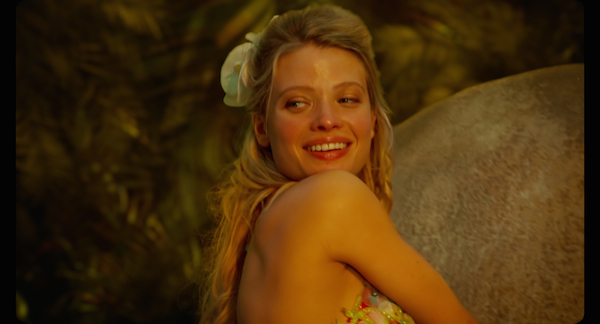
Photo courtesy of Amplify Releasing.
Sophia: Mélanie Thierry as Bainsley is a revelation.
Terry: Oh! She is well-known in France, but she has always played very beautiful, elegant, controlled women. This was a part that she had never been asked to play before. I told her, “Just think of Marilyn Monroe and Judy Holliday, and combine the two.” Mélanie does her own version, and she’s just breath-taking. She’s a great actress.
Then again, Lucas Hedges, who plays Bob —
Sophia: Oh, he’s great.
Terry: Isn’t he wonderful? It was very funny, because I only tested two actors for that part. I’d seen Moonrise Kingdom, and he jumped off the screen to me. There was something about him, his attitude, that I thought, “Ah, that’s good, he’s focused.” I sent him the script, and he sent back a few scenes on tape. I told him, “You’ve got the part. That’s it. Perfect!” It’s a big part. He’s playing opposite these great actors, and he really held his own brilliantly.

Terry Gilliam’s “THE ZERO THEOREM.” Photo courtesy of Amplify Releasing.
Sophia: The costumes by Carlo Poggioli are so fun and so imaginative. Could you talk about the inspiration for Management’s camouflage suit and the bathing suit that Bainsley wears at the beach?
Terry: The costumes were a product of no money, that’s how they came about. Carlo used plastic table cloths and plastic shower curtains for costumes. He found this Chinese market outside of Bucharest with these fabrics sold not by the yard, but by the kilo – which is very weird. They were all horrible man-made fabrics, but interesting patterns. So I’d had this idea of Matt blending into whatever background he’s at. Carlo found these fabrics, and did the curtains and the chair to match his costume. So you don’t know if he’s really there, or if it’s Qohen’s imagination, or if he is just a guy who likes camouflaging himself? With Bainsley’s bikini, Carlo just went crazy. He cut out all these shells and sea creatures, and made molds of them. They were all made of rubber, and to be honest, Melanie hated it because it was really painful. Bits were always digging into her (which Carlo didn’t expect), but it looks fantastic.
Sophia: It looks like she has risen up from the clamshell of Botticelli’s Venus —
Terry: That’s the thing. There’s a moment that I really love with Bainsley: when she first appears at Qohen’s chapel in her white latex outfit and her pink wig, at one point, she whips the wig off, and she goes from this plastic Barbie sex-doll into a real woman. In just the moment of that wig coming off, her face changes, the way she holds it. It’s just an amazing moment, to me. It’s those things that everyday get me excited when I’m working. When I see a moment like that, I say, “Yes! Great.”
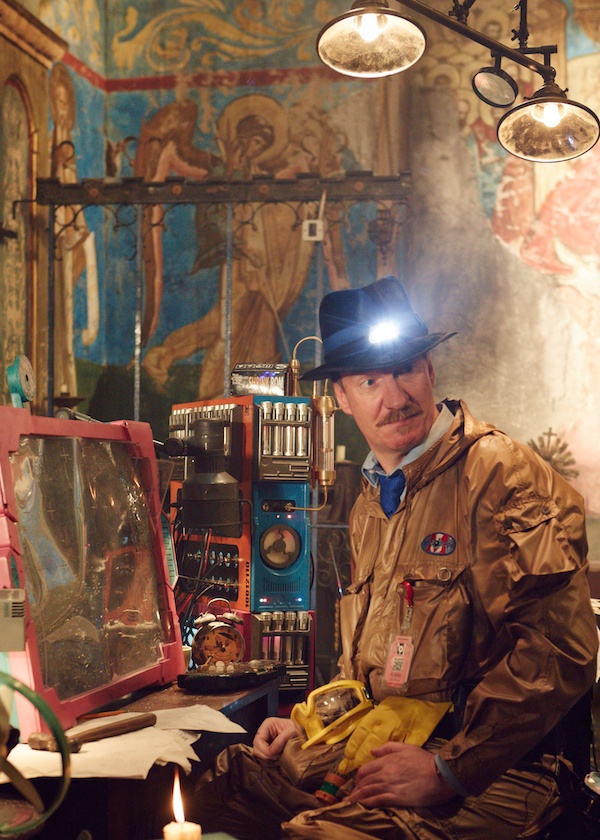
Photo courtesy of Amplify Releasing.
Sophia: Production design is so central to your works. In The Zero Theorem, you have created this rich and wonderful version of “London-Sooner-Than-You-Think.” Where do you start in your process of creating that world?
Terry: In Bucharest, I started by saying, “Well that street might be London, you could argue.” Then we just started adding to it. First was to add advertising – billboards, strips that run around buildings. It’s very simple. I don’t have a real plan. I just find things that I like and intrigue me. I think, we’ll use that, and we’ll make it tie in with something else. We’ll give it connective tissue once we get going.
It’s very hard for me to even describe how it works. It’s just instinctive. It’s like found art. “O.k., one of those things, we’ll do that and that, let’s stick ‘em together, and see what we’ve got. That’ll do. Let’s add that now …”
Dave Warren designed the chapel itself. So if religion is a dead, burnt-out thing, let’s get all of Christianity in there, I suggested — so we’ve got Catholic, Protestant, and Orthodox all within that one building. Then you start asking: What’s the story here? What’s in this room? Why is it like that? So I was thinking, Qohen probably at one point had just gotten married, he had bought this chapel at a knocked-down price, and he’s full of enthusiasm and energy. He’s got a young wife, and his whole future awaiting him. He’s going to do a lot of the work himself. So he buys this cement mixer and the building materials and starts in on it. It’s going o.k., but at some point he’s running out of steam; so he just goes to Ikea and buys some kitchen stuff and sticks it in there. It’s like playing with a doll’s house, is all it is. You’ve got to understand the characters and why they are doing what they are doing, and then you build a world around them.
I wanted the exterior world to just be so colorful and shrill, almost. The workplace is actually in this foyer of the Athenaeum, the big concert hall in Bucharest built by this French architect in 1888. It’s extraordinary design. I thought, let’s make that into the office rather than having this dull, modern office space. Then we built a central series of work stations that are a bit like those on the stock exchange floor, with things running around the top and individual partitions. Then I thought, let’s be ecological here, “pedal power” – each worker is providing the power for his particular work station. So with each of these things, you are building stories all the time. And that’s how it works.
Interestingly enough, there’s a German artist Neo Rauch, who I think is fantastic. I was looking at his paintings just before we were starting. I loved his surprising use of colors, of different periods, and even of different styles — from classical painting to graphics to full 3-D — all within a single painting, so that it collages. I was showing everybody, “Look at Neo Rauch, look at the color schemes, juxtapose this with that, and see what happens.”
Sophia: How did you discover Neo Rauch?
Terry: I don’t know. I just put my nose into things I shouldn’t be putting my nose into.
Sophia: So I have to tell you that his phone call is my thrilling phone call. Brazil and The Fisher King are two of my all-time favorite, most significant cinematic experiences. You had the great fortune to work with that other mastermind, Robin Williams, whose associative imagination, I imagine, struck a chord with your own. Did you remain in close contact over the years?
Terry: Oh, yeah, we were buddies. Maybe we never saw each other, but we were always in close contact. Six thousand miles, what’s that! I was actually trying to remember the last time I actually physically saw Robin — I think it was the opening of Spamalot in Las Vegas in 2007. Yet, Robin was always here. I find it weird, the older you get, how seldom you see your friends, and yet they’re always there. It shocks me when I start realizing how long it’s been since I’ve seen somebody with whom I’m very close. At one point, I thought Robin was going to come over for the Python show, there was a plan, and, of course, it didn’t happen.
It was a shock [his suicide], and at the same time, it didn’t surprise me. That’s all I can say. Because to be the genius that he was, is not a free lunch. There are demons. There are demons lurking in the shadows there. His genius was to keep the demons at bay for as long as he did. I looked at a bit of Fisher King after Robin died, and the scenes where he is being pursued by the Red Knight — that fit. That’s why Robin was so good in that film — because it gave him the range to show pretty much all aspects of his character. It’s painful to watch, but he was absolutely wonderful in the film. Another actor wouldn’t have been able to let himself be so exposed, so raw in those moments of suffering. I never felt at any time that he was acting. He was just letting [go], he was just going down into a pit that’s deep inside of him. It was quite chilling at times to be around him when he was doing that. It didn’t frighten him. It was something he dealt with all the time, I think.
Sophia: Do you feel a kind of urgency to get on with your great passion project, The Man Who Killed Don Quixote.
Terry: I was thinking of doing it posthumously now. [Huge laugh.] It will take the pressure off me if I can just say, “It will be my first posthumous film.”
No, I’m back in it, and it is depressing me. It gets me very frustrated — cause there’s a million things always in the way. But I think I may be closer this time than I’ve ever been in the past. I’m not even sure why I’m doing it anymore. It’s just, obsessions are obsessions – that’s it.
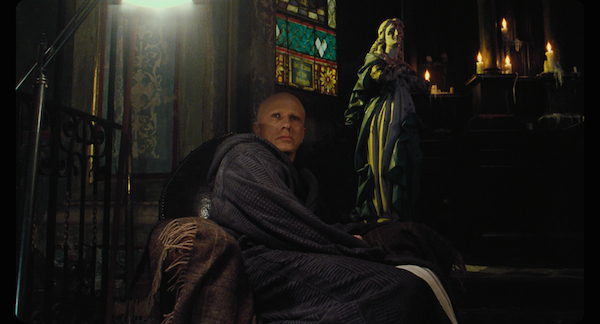
Photo courtesy of Amplify Releasing.
Sophia: Qohen is obsessed for a time in the film with solving this impossible problem. My husband who is a scientist was talking about the science of it all, and he was like, it’s an obsession, a great obsession.
Terry: Qohen is really good at what he is doing but like so many people that are doing an important job or what could be an important job, that they don’t actually think of the consequences of their work. They don’t consider anything beyond just solving the problem. That was the job that I was given to do, and that’s what I’m going to do. I think Qohen is such a drone. When we were shooting, I kept saying, “He’s a selfish bastard.” He’s totally egocentric. You could argue, he’s become like that as a way of surviving the damage that has occurred throughout his life. But ah, come on, grow up! I’m like Bob, the kid. When Qohen despairs, Bob says, “Forget it. Everybody has problems. Move on.” I feel that about Qohen. Not just that life has become difficult and that he has been hurt many times, but he’s also impotent, in the sense that he doesn’t have power. That’s the part that I always find is so much about the world we’re living in now. People, do they have power anymore? Do they believe they have power? I feel so many people don’t. So they lose themselves in stuff. That’s why, I believe, the modern world has got a million distractions – so that you can go playing in the web for the rest of your life and never [come out]. They’ll always still be new things to find. But these may be distractions from important things, it seems to me.
Sophia: You have said, “A lot of people would like to be able to influence the world more than they are likely to do. My whole life has been learning how little influence one actually does have, despite one’s best efforts.”
Terry: Yeah. And that’s it. That’s why in the end, I give Qohen power. [Infectious giggle.] It’s a questionable power. It’s a very sad power. To let the sun sink, in a virtual world. Is this really it? That’s the best he can do, man? But at least he has come to terms with something.
Sophia: There is that wonderful image of all the photos falling into the black hole, all those digital portraits. It is stunningly beautiful. Can you talk about that image?
Terry: I just loved the idea that inside that computer is all the information, all the people. At the end when it blows up, they are just floating. Sadly, that’s the darkness of this thing. They’re all descending into this black hole. I have been told that it’s a very nihilistic film. I don’t quite believe that.
When we finished it and added that very last shot after the credits (the Mancom camera on the headless Jesus), then suddenly all the NSA revelations came out. Not that they surprised me, not at all … but each step [of revelations] was greater than anything else. I thought, it’s never gonna end. But people aren’t fighting it. They’re going along with it — because they want their selfies, they want their little moment of fame, they want to keep being, keep existing on the web in the form of selfies or tweets or whatever. And I find it extremely depressing.
The only thing that’s happened recently [by way of protest] was “Occupy Wall Street.” These people got out there. But again, even the mainstream media didn’t cover it for a long time; they were ignoring it. And then I put the nail into the coffin by then turning their slogan into an advertising slogan: “Occupy Mall Street” [We share a big laugh.] I want the corporations to take even the power of those people away. “Occupy Mall Street! Shoppers of the world unite.” Let’s take all the great political slogans. So I really felt in the end that I had covered a lot that I’d wanted to say about the world we are living in at the moment.
Top Image: Christoph Waltz (Qohen), Terry Gilliam’s “THE ZERO THEOREM.” Photo courtesy of Amplify Releasing.
